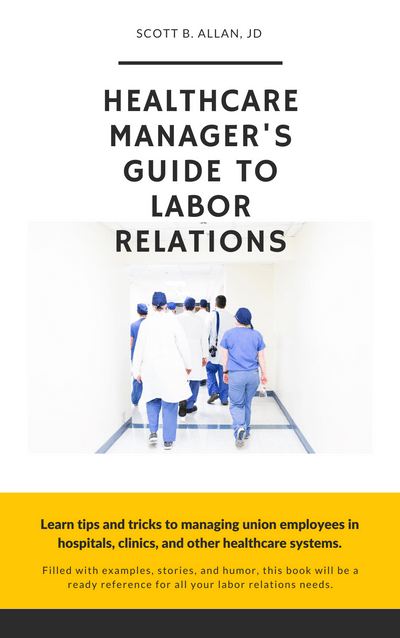Healthcare Labor Law
Negotiations
In a unionized healthcare environment, you are always negotiating. You’re negotiating when you:
- Settle a grievance
- Discuss alleged contract violations with a union steward
- Debate changes at your Nursing Care Conference or Labor-Management Committee
- Strategize unit reorganizations or staffing changes
- Bargain a contract with the union
While some situations may require that you simply “meet and confer” or “impact bargain,” it can still look and feel like full-blown negotiations. If you’re not prepared when you meet with the union, you can get crushed.
Too often, managers try to “wing it” and enter the fray unprepared. If they were dealing with a “friendly combatant,” that might be ok. However, union representatives are often very unfriendly. They will yell, pound the table, spring things on you, lie, and make negotiations tragically difficult – even when you’re prepared.
After negotiating hundreds of labor contracts and thousands of grievances, our team is ready to share our secrets with you so you can get away from the bargaining table and back to caring for your patients.
With over 25 years of labor relations experience, we can help you minimize the pain of bargaining. We have worked with many of the nation's largest labor unions and negotiated competitive contracts. We can lead the negotiations or help you through the process. Either way, we will:
- Review your current labor contract
- Assess your needs and priorities
- Review local standards and see where you are in the market to ensure competitive outcomes
- Act as lead negotiator or support your company's negotiation team
- Review and draft contract language and proposals
- Create employee communications to keep your staff updated
- Train the negotiation team on best practices for negotiating a contract
- Help with mediation
- Suggest ways to minimize prep time for bargaining
- Implement strategies for reaching faster settlements
- Develop easy costing tools to evaluate the real impact of a settlement
- Tips and tactics that let you control the bargaining process
Five “To Do’s” Before You Start Negotiations
Imagine this…. You just won an all-expenses paid trip to Europe - for the whole family. Unfortunately, you leave tomorrow. You can easily picture the absolute chaos and stress you’d go through. So why would you put yourself through the same thing when the union hands you a strike notice?
It happens all the time. Negotiations are slogging along with no progress. You’re miles apart on wages and have agreed to almost nothing. The contract expires, and BAM!...you get a strike notice. Now what?
Have you done any planning? Do you know what to do first? Who should you call? The local newspaper picked up the story and wants a comment. Employees are flooding HR asking questions and worried about losing their jobs. Patients are growing concerned, and the Board members are getting calls at home. That magical trip to Europe is starting to look really good…
To avoid the chaos and stress, simply take a little time before you begin negotiations and do these five things:
- Get a Body Count – If the union did go on strike, how many employees would you need to replace? Your numbers don’t have to be precise, just “in the ballpark.” Make a conservative estimate of how many might cross the picket line, e.g., 1,200 could walk off the job, but 200 would probably cross the picket line. Then….
- Make Some Calls – Now that you know how many employees might go on strike, find out how much it will cost to “replace” them. Contact some “strike replacement” companies and get an estimate. Find out how much notice they need to get replacement workers, e.g., can they get 800 nurses in three weeks? Here’s a short list of strike replacement companies:
- Madi – madicorp.com
- Huffmaster – huffmaster.com
- US Nursing Corporation – usnursing.com
- Nurse Bridge – nursebridge.com
- Rapid Staff – rapidstaff.com
- Healthsource Global Staffing – healthsourceglobal.com
- Pick a Boss – When the strike starts, you’ll need a “Strike Coordinator.” The Coordinator is responsible for the overall strike planning and coordination. You will ultimately form a committee (“Command Center”) to run the strike, but the Strike Coordinator will have the overall responsibility to see that all efforts are synchronized. It should NOT be the lead negotiator or member of the negotiation team; they’ll be busy trying to get the deal done. The Strike Coordinator is often a senior member of the leadership team, usually in Operations. Once selected, keep your Strike Coordinator updated on negotiations.
- Draft Your Command Center Team – You’ll need to draft colleagues to be part of the “Command Center.” This is the group that will run the strike. The team members will vary depending on the strike. For example, if it’s a nursing strike, have representatives from: HR, Legal, Patient Care/Nursing, Communications, and Security. You can certainly have others, but this would be the minimum crew. The Strike Coordinator should keep the Committee members informed throughout the negotiations and convene the team when necessary.
- Plan Your Trip – Negotiations are a journey. You start, you wander, you arrive. However, you know if you don’t “arrive” on the contract expiration date, the union can go on strike. Working back from that date, pick some milestones. When should you start planning for the strike? When did the “strike staffing” company need notice? When should you start curtailing vacation requests to ensure you have enough supervisors and other staff to handle the strike? When should the “Command Center” convene? When is the first date the union could possibly strike? Map it all out on a calendar.
- Basic Communications and Talking Points – There are a few basic template talking points and communications that everyone uses in a strike, e.g., letter to the employees, media statements, “do’s and don’ts” for a strike, message to the patients and families, etc.. Have them ready to roll before you need them. You do not want to be drafting these for the first time after you get the strike notice.
All these tasks could be done in a few hours. Do them before you start negotiations. You shouldn’t be doing detailed planning at this point. Simply get some rough numbers together, appoint some folks to a committee, make your “map,” and draft some communications. If you never have to hire replacements, invoke the committee, or send out a letter, great! However, if you see the storm brewing, you’ll be much more relaxed knowing that you’ve got these preliminary matters done.
Healthcare Labor Law Newsletter - Subscribe!
Available Now!
On July 26, 1974, Congress gave private sector healthcare workers the right to join unions. Since that day, healthcare employers have been flooded with union activity. From organizing campaigns to strikes, healthcare employers have struggled to keep up with the aggressive tactics and disruptive behaviors of the union movement. Based on over 25 years of experience, this book will help healthcare managers wade through the morass of union activity and lead with confidence. Providing innumerable tips, tricks, examples, and stories - including some “insider insights” – The Healthcare Manager’s Guide to Labor Relations will be your go-to source for all your labor relations issues.


